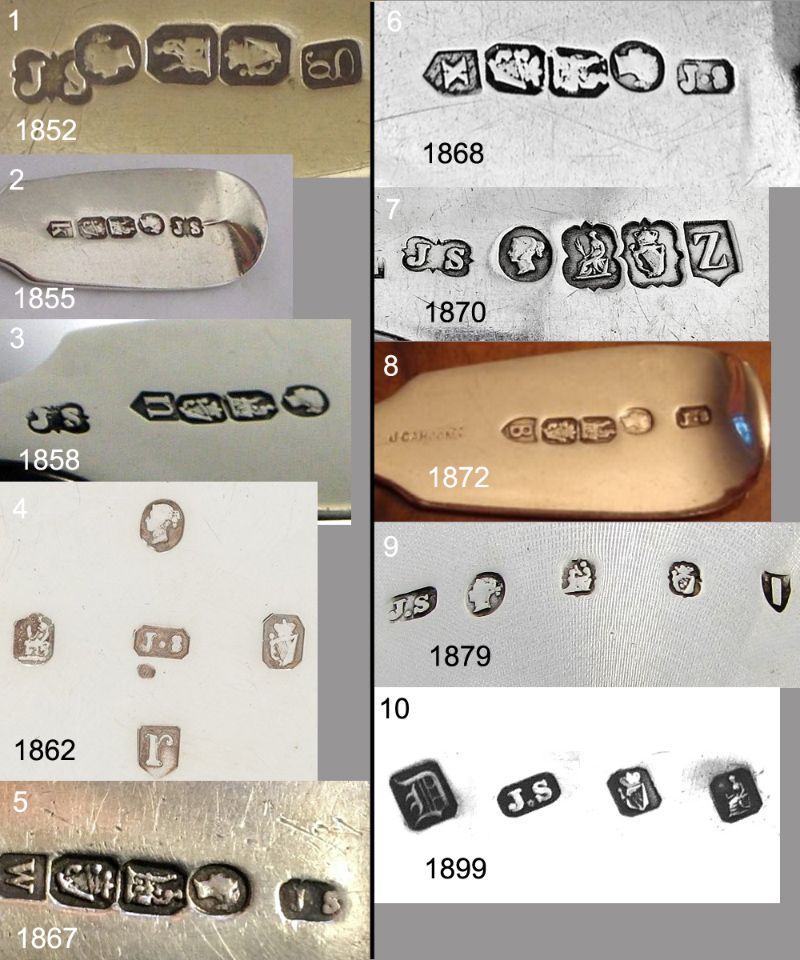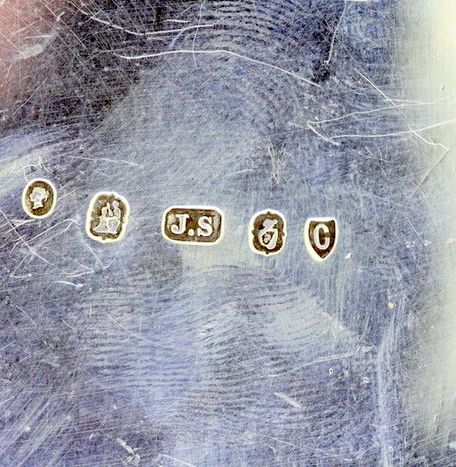Page 1 of 1
Irish spoon
Posted: Wed Feb 08, 2017 6:40 pm
by DGol
Hello, I have never tried to research hallmarks before and would like confirmation on what I *think* these marks mean. Is that Victoria? And the date 1867? This is puzzling because the initials on the spoon, "LHM" and the Morton family crest, seem to indicate my 3rd great-grandfather, Lewis Hawkes Morton (1762-1839). So I wonder if I am reading the marks right. Also I can't figure out what the third mark is, the one that looks like a chair. Any help will be gratefully received! Thank you.


Re: Irish spoon
Posted: Wed Feb 08, 2017 6:44 pm
by DGol
I hope you can see the images in my post ... I can't! Am going to try linking to the Google photos.
https://goo.gl/photos/2QK6foQsUkJbw73s6
https://goo.gl/photos/FkyhRfQfKZidgmHS7
Re: Irish spoon
Posted: Wed Feb 08, 2017 6:48 pm
by DGol
Wish I could edit my previous posts instead of adding replies like an idiot. LOL ... anyhow, here are the hallmarks I was talking about.
https://goo.gl/photos/PqUEJwiZsRuuAdcL6
Re: Irish spoon
Posted: Wed Feb 08, 2017 7:17 pm
by SteveDWollongong
Hi Diane,
The marks reading from top to bottom are:
Maker - JS, but unknown to me.
Duty mark - Queen Victoria
Dublin Assay Office - Hibernia
Irish Silver Fineness Mark - Crowned Harp denoting 925 sterling silver. (This is like the lion rampart/passant used in England).
Cheers,
Steve
Re: Irish spoon
Posted: Thu Feb 09, 2017 12:30 am
by DGol
Thank you very much! And am I correct that the W at the bottom indicates 1867?
Re: Irish spoon
Posted: Thu Feb 09, 2017 4:47 am
by SteveDWollongong
Sorry, I meant to confirm that for you and forgot. You are correct with the 'w' being 1867.
S
Re: Irish spoon
Posted: Thu Feb 09, 2017 11:13 am
by scorpio
Hi Diane,
Yes, it's a Dublin silver spoon fully hallmarked for 1867 but as to who the silversmith is, I don't know either. At first I though maybe John Smyth but he died in 1855. Another silversmith, also John Smyth and possibly his son, worked after him and used a similar J.S mark. Neither of their marks resemble the J.S on your spoon.
Douglas Bennett doesn't show this J.S mark in his books on Irish silver and neither is it found in Jackson's Silver & Gold Marks. You can find the mark illustrated on this website (3rd mark down on left column) but as you can see, it remains unattributed:
http://www.925-1000.com/dlDublin4.html#M
Gordon
Re: Irish spoon
Posted: Thu Feb 09, 2017 12:08 pm
by scorpio
Further to my previous note, I’m going to get more particular as to how I type the maker’s mark as we need to differentiate between J•S, used by the original John Smyth (Smith), who died in 1855 and the second John Smyth (let’s call him John Smyth Jnr.), who used J.S. On your spoon, the letters seem to be a slightly more widely spaced J • S.
I discovered a spoon dated 1872 and a set of six spoons with what appears to be the same J • S maker’s mark as your spoon. In each instance, the sellers attribute them to John Smyth (presumably John Smyth Jnr.), but on what basis I do not know and it is most likely mere assumptions rather than definitive.
An Irish auction house mentions spoons with rubbed possibly J.S marks dating to 1794 and 1798. Another set of spoons I came across, dated as late as 1904, has the mark J.S, which is the same mark attributed to John Smyth Jnr. So, unless the mark J • S can be definitively shown to be that of John Smyth Jnr., it remains unattributed.
Re: Irish spoon
Posted: Thu Feb 09, 2017 12:11 pm
by scorpio
Further to my previous note, I’m going to get more particular as to how I type the maker’s mark as we need to differentiate between J•S, used by the original John Smyth (Smith), who died in 1855 and the second John Smyth (let’s call him John Smyth Jnr.), who used J.S. On your spoon, the letters seem to be a slightly more widely spaced J • S.
I discovered a spoon dated 1872 and a set of six spoons with what appears to be the same J • S maker’s mark as your spoon. In each instance, the sellers attribute them to John Smyth (presumably John Smyth Jnr.), but on what basis I do not know, most likely assumptions than being anyway definitive.
An Irish auction house mentions spoons with rubbed possibly J.S marks dating to 1794 and 1798. Another set of spoons I came across, dated as late as 1904, has the mark J.S, which is the same mark attributed to John Smyth Jnr. So, unless the mark J • S can be definitively shown to be that of John Smyth Jnr., it remains unattributed.
Re: Irish spoon
Posted: Thu Feb 09, 2017 12:33 pm
by dognose
I've always considered that mark to be that of John Smyth, later John Smyth & Sons. To my knowledge the firm moved gradually away from domestic silverware (no doubt because of cheaper English imports) and more into ecclesiastical wares in the later part of the 19th century and well into the 20th century.
See:
http://www.925-1000.com/forum/viewtopic ... 38&t=18350
and:
http://www.925-1000.com/forum/viewtopic ... 75&t=32412
Trev.
Re: Irish spoon
Posted: Thu Feb 09, 2017 3:26 pm
by DGol
I found an image on this website that looks to me to be the widely-spaced J S, attributed to John Smythe/Smith used in the "last quarter of the 19th century." If this is indeed that mark and dates from 1867, it was obviously in use prior to 1875, so perhaps the note is incorrect?
Re: Irish spoon
Posted: Sat Feb 11, 2017 5:32 pm
by scorpio
As I time on my hands yesterday, I compiled a montage of number of marks used throughout the second half of the 19th century, all of which have been attributed by a dealer, auction house or other seller to John Smyth.

Photos 1 (1852) and 2 (1855 - the year John Smyth is said to have ceased working) show one of John Smyth's known maker's marks, the quatrefoil J S mark as portrayed in Douglas Bennett's book "Collecting Irish silver", although the shape is more like Bennett's mark 305 but without the dot than Bennett's mark 306. Photo 3 (1858) shows that his son(s) continued to use this mark. It is interesting to note that this mark was still in use as late as 1870 as seen in Photo 7. However, I could not find any silver with it during the 1860-1869 decade, which isn't to say such silver does not exist, just that I could not find any examples online of John Smyth's work showing the maker's mark for those years.
The first example I could trace of the J • S maker's mark in a clipped rectangle (same as Diane's 1867 spoon shown in Photo 5) dates to 1862 (Photo 4) and it continued through 1868 (photo 6) until 1872 (Photo 8). In 1873, another known mark of John Smyth appears, that of J.S in a clipped rectangle and it continues for many decades (see photo below and Photos 9 & 10 above).

If it weren't for the 1870 J S quatrefoil mark (Photo 7) and the fact that J • S in a clipped rectangle appears before and after it, one could surmise that John Smyth used this J • S mark during the 1860s before changing to J.S in a clipped rectangle in 1873. However, the use of the quatrefoil-shaped mark in 1870 casts some doubt on this. If anyone can trace other silver by John Smith dating to the 1860s with the quatrefoil J S mark or any other mark, please post.
Websites that display Irish silver makers' marks and portray the J • S mark, including the 925-1000 Forum, show it as unattributed. So, was it used by John Smyth and if not, who was this maker?





